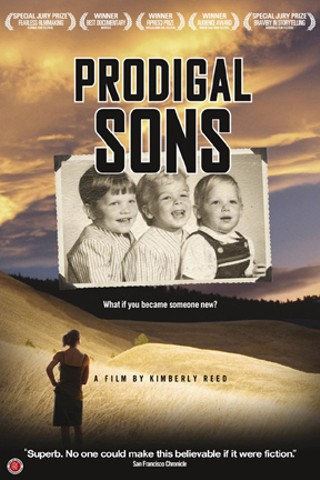Kimberly Reed's 20-year high school reunion offered her a chance to reconnect with her family in Montana—and redefine a relationship with a brother she hadn't seen in more than a decade.
Her older brother Marc remembered and idolized her as Paul McKerrow, the star quarterback for the Helena High School football team, and the young man who was voted "most likely to succeed" by his senior class.
However, Reed has a much different memory of the years before she underwent a sex-change operation.
"I pretty much repressed my feelings about my gender and tried to channel it into other things," said Reed. "I thought that being successful in things like football and school would make me normal and allow me to succeed at the things normal people do."
Reed documents her homecoming in Prodigal Sons, a film that delves into Reed's personal identity, her family and her attempts to make peace with her past.
"It was very clear to me that Prodigal Sons was going to be a film about identity and identities changing," she said. "More than that, it became a film about family and how our identities changed against the backdrop of our family."
Reed said one of the more shocking things she discovered on her trip home was the lack of negativity from old friends and acquaintances.
"As these things often go, I was reading into the situation a lot and prejudging the whole event," said Reed. "You know, when I got there, I thought everyone was really cool ... and I knew it was good to have the football team on my side."
Reed said many of her old friends were themselves surprised that her sex change was not that big of a deal to them.
"Prejudice often happens before there is a human face on it," said Reed. "Once it is someone you know, and you can relate to them one-on-one as an individual, it makes the whole thing so much more accessible."
While Reed found many of her old friends to be accepting of her new gender, her brother Marc, who was adopted, was unable to let the image of Paul McKerrow fade into the past.
At the age of 21, Marc suffered a traumatic head injury in a car accident. Several years after the accident, Marc started to experience serious mood swings, spurts of violent aggression and an ever-increasing obsession with the past.
Reed hoped her brother might overcome his insecurities and his obsession with the past after the surprising discovery that he is the biological grandson of legendary filmmaker Orson Welles and actress Rita Hayworth. However, Marc's mental situation actually worsened, and he was hospitalized after he attacked his younger brother Todd.
While the McKerrow family's problems might seem rather unique, Reed said that audiences can relate to the film, because it portrays the bonds of family loyalty.
"I think if you get under the surface a little, it is about sibling relationships," she said. "Anyone who has a sibling or a family can relate to it."
For that reason, Reed said, the title of the documentary was based on the biblical parable of the prodigal son.
"A story about unconditional love that also encompasses a sibling rivalry really resonated with what is going on in the film," she explained.
Reed said that Prodigal Sons will probably be the hardest film she'll ever make, because it forced her to examine a part of her life that she didn't want to revisit.
However, when it comes to making hard decisions about one's identity, you just have to follow your gut, Reed said.
"No matter what gender you are, or where you start out, or where you are going, you have to do it for yourself, and not because of anyone else," she said. "And that goes for anyone, even if your gender isn't an issue."




